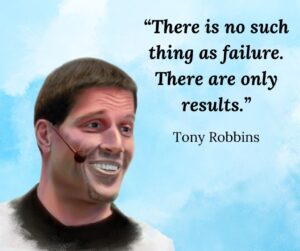In the realm of personal development, few voices resonate as profoundly as Tony Robbins. His powerful teachings and motivational insights have helped millions transcend their limitations and achieve extraordinary results. Among his many pearls of wisdom, one statement stands out: “There is no such thing as failure. There are only results.” This simple yet profound idea has the power to shift perspectives and transform lives. Let’s delve into what this means, why it matters, and how you can apply it to unlock your full potential.
Understanding the Concept: Failure vs. Results
At first glance, the notion of “no such thing as failure” might seem overly optimistic or even dismissive of reality. After all, everyone has experienced moments of falling short, whether in relationships, careers, or personal goals. However, Robbins isn’t denying that things can go wrong; instead, he’s reframing the way we interpret those experiences.
Failure, in its conventional sense, is laden with negativity. It suggests a definitive endpoint—a verdict of inadequacy or defeat. By contrast, Robbins encourages us to see every outcome as a result. Results are neutral; they are neither inherently good nor bad. They are simply feedback, a reflection of actions taken and decisions made. This shift in perspective allows us to move away from self-criticism and towards constructive evaluation.
The Psychology Behind the Philosophy
Why is it so important to view failures as results? The answer lies in the psychology of growth. When we label an experience as a failure, it often triggers feelings of shame, fear, and helplessness. These emotions can paralyze us, preventing further action and stifling innovation. Conversely, when we view the same experience as a result, we activate curiosity, resilience, and problem-solving skills.
This mindset aligns with the principles of growth mindset psychology, popularized by psychologist Carol Dweck. A growth mindset emphasizes the belief that abilities and intelligence can be developed through effort and learning. Viewing outcomes as results rather than failures fosters this mindset, encouraging us to experiment, adapt, and persevere.
Real-World Applications of the Results-Oriented Mindset
The results-oriented mindset isn’t just theoretical—it has practical implications across all areas of life. Here are some key examples:
- In Personal Development
Imagine setting a goal to lose weight or learn a new skill. Along the way, you may encounter setbacks, such as indulging in unhealthy habits or struggling with complex concepts. Instead of seeing these as failures, you can view them as opportunities to assess your strategy. What worked? What didn’t? What adjustments can you make? This approach keeps you moving forward instead of succumbing to frustration.
- In Business
Many of the world’s most successful entrepreneurs, including Steve Jobs and Elon Musk, embody this philosophy. They understand that innovation requires experimentation and risk-taking. When a product launch flops or a strategy falls short, they don’t wallow in defeat; they analyze the results, learn from them, and refine their approach.
- In Relationships
Relationships, whether romantic, familial, or professional, are often fraught with misunderstandings and disagreements. Viewing these challenges as results rather than failures allows you to focus on improving communication and finding solutions, rather than assigning blame or dwelling on the past.
- In Education
For students and educators alike, the concept of results is invaluable. A poor grade on a test isn’t a final judgment of ability; it’s feedback on areas that need improvement. This mindset encourages continuous learning and resilience in the face of academic challenges.
Strategies for Embracing the “No Failure, Only Results” Mindset
Shifting your perspective to align with this philosophy requires intentional effort. Here are actionable strategies to help you embrace this empowering mindset:
- Reframe Your Language
Language shapes our perception. Replace words like “failure” and “mistake” with “result” or “outcome.” For example, instead of saying, “I failed at this project,” try, “The project didn’t yield the results I wanted, but I learned XYZ.”
- Focus on Feedback
Every result, whether positive or negative, contains valuable lessons. Train yourself to ask questions like:
- What does this result teach me?
- What could I do differently next time?
- How can I use this experience to grow?
- Adopt a Long-Term Perspective
Failures often feel monumental in the moment, but when viewed in the context of a lifetime, they are merely stepping stones. Remind yourself that each result contributes to your broader journey of growth and success.
- Celebrate Effort
Results aren’t just about the end goal—they also reflect the effort invested. Celebrate your willingness to try, experiment, and take risks, regardless of the immediate outcome.
- Surround Yourself with Support
Cultivate a network of people who embrace a results-oriented mindset. Their encouragement and constructive feedback can reinforce your resilience and determination.
Stories That Inspire
History is replete with examples of individuals who turned apparent failures into stepping stones for success by focusing on results. Here are a few:
- Thomas Edison
Edison famously remarked, “I have not failed. I've just found 10,000 ways that won't work.” His relentless experimentation ultimately led to the invention of the light bulb, revolutionizing modern life.
- J.K. Rowling
Before becoming one of the world’s most celebrated authors, Rowling faced rejection from numerous publishers. Instead of giving up, she used each rejection as motivation to refine her manuscript, leading to the eventual success of the Harry Potter series.
- Michael Jordan
Widely regarded as one of the greatest basketball players of all time, Jordan has spoken candidly about his setbacks, including being cut from his high school basketball team. He viewed these moments as opportunities to work harder and improve, fueling his legendary career.
The Ripple Effect of This Mindset
When you embrace the belief that there is no such thing as failure, only results, you don’t just transform your own life—you inspire others to do the same. This mindset fosters a culture of resilience, innovation, and collaboration. It encourages people to take risks, support one another, and view challenges as opportunities for collective growth.
Final Thoughts
Tony Robbins’ assertion that “there is no such thing as failure, only results” is more than a motivational slogan—it’s a blueprint for a life of growth, resilience, and achievement. By reframing our understanding of setbacks and embracing the lessons they offer, we unlock the potential to achieve our goals and live more fulfilling lives.
So, the next time you encounter an obstacle, pause and ask yourself: What can I learn from this result? In doing so, you’ll discover that every experience, no matter how challenging, has the power to propel you forward.


















